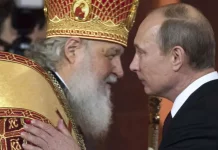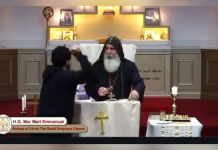One year ago tomorrow, the president of Ukraine was dressing in the middle of the night. His wife asked what was happening. Volodymyr Zelensky replied: “It’s begun.”
It had indeed begun. The Russian decision to invade Ukraine was a monumental act of evil. It was a sentence of exile to 18 million Ukrainians – eight million of whom are still refugees. It was also a death sentence for thousands: 200,000 Russians and more than 100,000 Ukrainians.
I saw it with my own eyes just before Christmas, when I visited Christian communities in Kyiv. The site of the mass grave in Bucha, where innocent Ukrainians murdered by Russian troops and left in the streets had been hurriedly buried by the brutalised community. The “Bridge of Hope” where desperate people scrambled to escape the oncoming onslaught. The extraordinary courage of Ukrainians facing winter with no electricity or uncertain journeys across Europe – an echo of Europe’s darkest moments.
Today, the war is in a state of attrition. We see trenches like in the First World War, cities destroyed as they were on the eastern front during the Second World War. In the face of this, as Christians, we have to think deeply about what the gospel of Jesus Christ would mean in practical terms.
The Ukrainian defence is one of the most heroic examples of courage and improvisation since the British at Dunkirk. Ukraine has paid with the lives of its soldiers and civilians for the security of Europe.
What then should we do that is ethical and wise? Our support for Ukraine must continue. The potential failure of international support was the greatest fear when I visited Kyiv.
The UK and others in Nato have helped Ukraine, taking in refugees and providing ammunition and other supplies. We are not at war and do not desire war with Russia. Our commitment to Ukraine’s defence is in money, not the lives of our soldiers, and is necessary and right if we want to avoid harder choices. The pathway we are now on – a war of attrition – will continue until one side seeks a negotiated settlement. What can military planners, policymakers and leaders do to create other choices leading to sustainable peace?
First, by continuing to invest in defence for Ukraine to pursue its campaign, we must show there is no impunity for wars of aggression. But we must also match this with investment in peacebuilding engagement and strategy.
Second, Ukraine cannot be forced into a Munich Agreement-like compromise. Ukrainians must not be pressured into an unjust peace.
Third, preparations must begin to rebuild when the time comes.
Provided a just peace between Russia and Ukraine can be achieved, there must be a security structure that makes another war unlikely. Russia cannot end up like Germany after 1919; it must be able to recover and be secure without being allowed to repeat its aggression. The great powers must find ways, ideally through a conference, to design the conditions for long-term security, as was done in 1945. Today it must be done for a new century, including UN reform, while the cost of conflict is fading from most European memories.
The words used here are almost all from the Christian tradition that still guides European ethics. Justice is the call of Old Testament and New: peace, swords – or tanks – into ploughshares is the vision of Isaiah. Everyone eating the grapes from the vines they planted and living in the house they built is the promise of the prophet Micah.
At the heart of Christian faith is the vision of God who so loved the world that he sacrificed himself for it, so there may be peace and reconciliation.
In times of peace, we dream of such things. In times of war, we must strain every sinew to bring peace with justice, and start the generational process of healing hatred and rebuilding community among nations.










